The AI Tipping Point: A Consultant's Takeaways from CMS Kickoff 2024
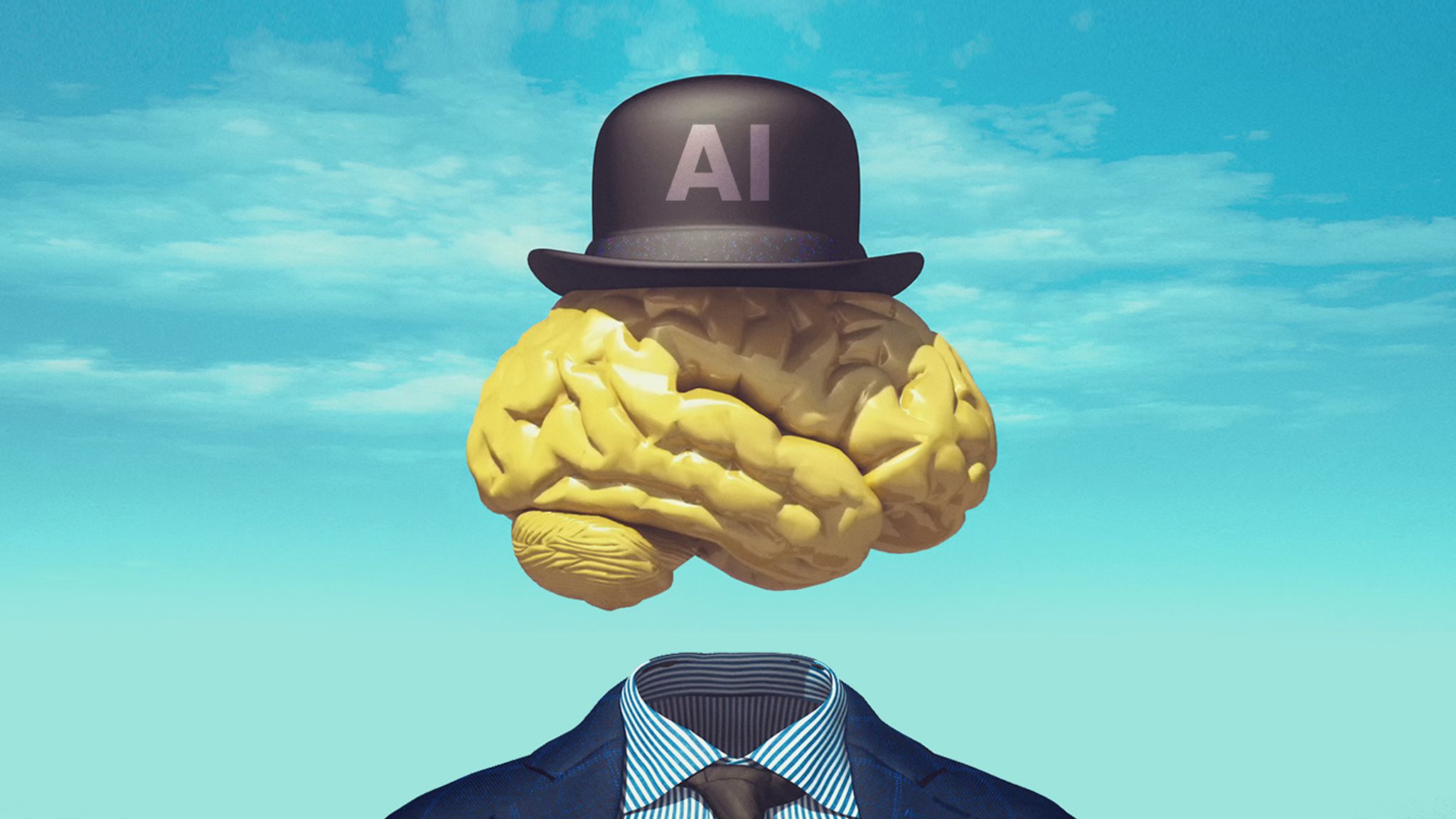
As a first-time attendee at the Boye & Company event, I didn't know what to expect. But the speakers and content left me with a deeper understanding of the future of CMS – and how AI is changing everything.
Tom Cranstoun is the principal consultant at Digital Domain Technologies Limited and a CMS Critic contributor.
Reflecting on the Boye & Co CMS Kickoff 2024 down in St. Pete Beach, it's clear we're at a tipping point with AI in the CMS space. The event was a melting pot of CMS enthusiasts and experts, all there to predict and shape how we handle CMS. The setup was perfect for learning, networking, and bouncing ideas off one another, with sessions covering a wide range of topics.
We had some standout talks, like Deane Barker's Q&A and Kristina Podnar's insights into Generative AI. Becky Brown and David Rasmussen hit home the importance of change management for content teams. Mike Wills' take on flexible content models for multichannel strategies was enlightening, and Jeff Eaton shed light on how CMS page builders affect team dynamics.
Brian Browning showed us practical AI applications that are changing digital experiences. Debbie Tucek pushed us to think of content as a product, while Ricky Frohnerath's masterclass on high-performance content teams was a game-changer. Nick Rudd's perspective on AI in real-time content generation was eye-opening, and sessions by Marli Mesibov and Brian McKeiver on the CMS buy vs. build dilemma and digital commerce were thought-provoking.
The twist in my expectations
I noted that the agenda of the CMS Kickoff 2024 offered only a slight focus on AI. The speakers often mentioned it during their talks; it’s very “of the moment” in our industry.
I, like you, have been to many seminars, presentations, and conferences around AI and what it will do for you and your content. I was pleasantly surprised this was not about AI creating the content – it was about AI reading the content. It turned my expectations upside down, fired up my brain, and I could not stop taking notes.
The whole CMS Kickoff conference was not just about AI. I have many takeaways that I am working on. But the most important is this: the AI revolution will change our industry and everyone else’s. Still, despite its great promise and clear benefits, it soon becomes clear that using AI to create content is not ideal. In fact, AI-generated content has many problems, including:
- Enforcing the use of internal style guides.
- Maintaining a brand tone of voice.
- Avoiding gender or race biases.
- Avoiding cultural nuances.
- Knowing which sources were used in the training of the AI (too few sources means limited vocabulary – conversely, too many sources suggest the corporation loses control. Does the AI manage to use local idiomatic expressions? For instance, a “sidewalk” is a “pavement” in the UK).
- AI sometimes gives up asking the prompter to continue.
- AI is becoming regulated, and legal ramifications will soon become commonplace, changing in each jurisdiction.
And this is just the beginning.
Rethinking AI’s role in content management
Throughout the event, the speakers made me rethink AI's role in content management. Given the translation, bias, regulation challenges, and lack of trust in AI, one needs to employ reviewers and editors to correct the content – because AI is better suited for consuming content.
Let’s think that the current state of AI creating content is a beta experiment, best left to the tech guys. After all, we have a business to think of.
Nick Rudd led an exciting discussion explaining how AI should be thought of. He began by asking how an eight-year-old purchases toys. He described it as simple and direct, without the baggage of brand loyalty or complex decision-making.
Kids are smart. They know what they want.
Ignoring the elephant in the room, “TikTok” (an entirely different article), the eight-year-old goes to Google/Bing/Whatever and types in:
“I WANT A TOY PLESIOSAURS”
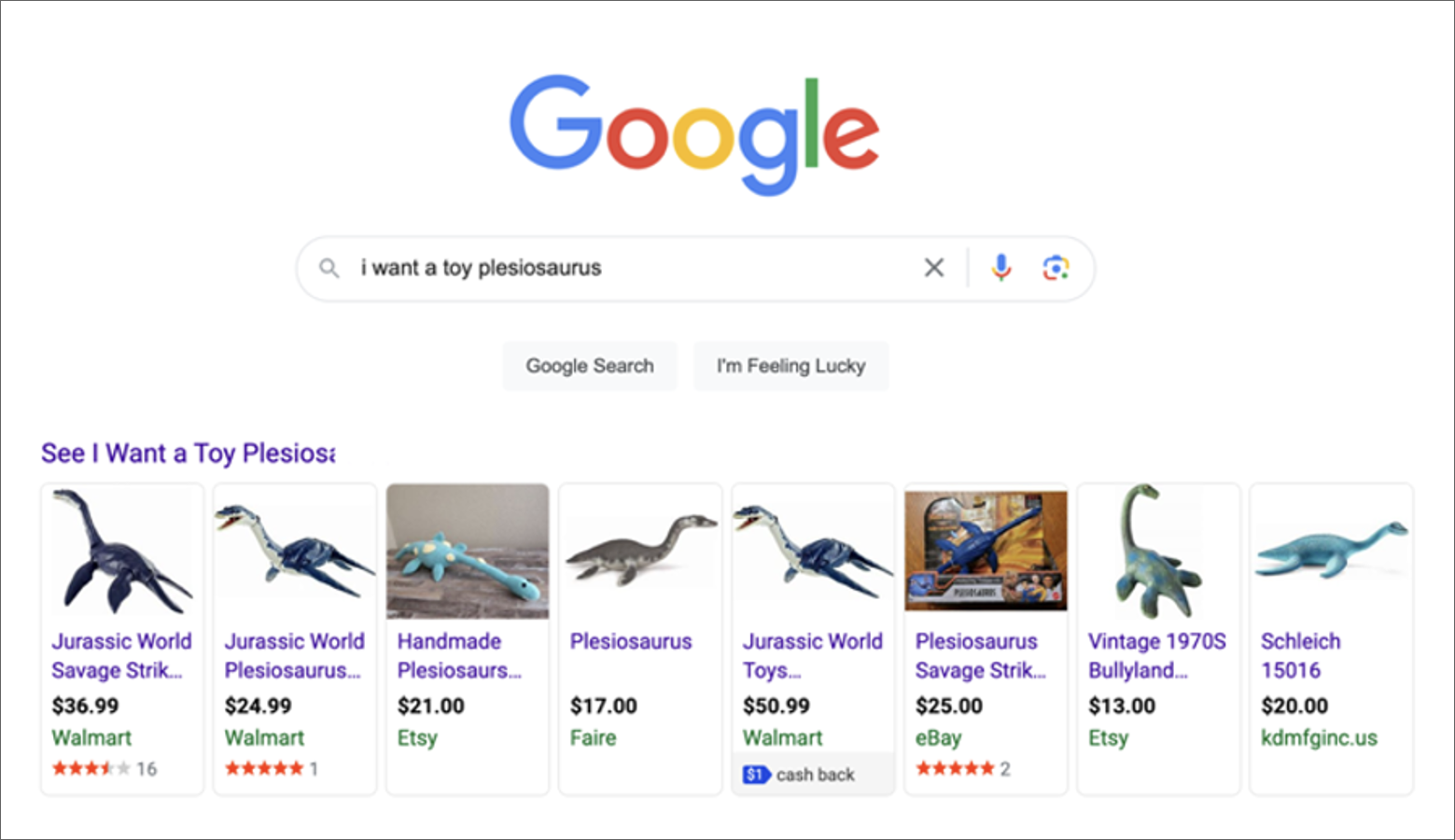
What didn’t the eight-year-old do?
- They didn’t go to Amazon.
- They didn’t refine the search.
- They didn’t look at brands.
- They didn’t read customer reviews.
- They didn’t sort by price or popularity or whatever.
- They didn't read the price (well… mostly).
- They didn’t create an account.
- They didn’t click on dropdowns.
- They ignored video and animations.
- They didn’t read the copy.
What happens when AI reads content? It behaves like an eight-year-old:
- It will ignore retailers.
- It will probably not refine the search.
- It will ignore brands.
- It might skim customer reviews.
- It might sort by price.
- It won’t create an account.
- It won’t follow your dropdowns.
- It won’t give you an email address (you no longer know who your customers are).
- It will ignore the videos and animations.
- It will ignore the “see our shop links”.
- It will skim-read the copy if it can find it among the ads.
How will “AI simplicity” affect your business?
The idea of simplicity will challenge how AI interacts with our current web designs and content structures.
The next step in AI monetization is that the AI offers to purchase the toy – keeping any discounts, commissions, and recommendation fees bypassing the retailer. This will impact KPIs as AI activity increases and human interaction decreases.
What happened to StackOverflow recently will begin to affect us all. The online Q&A platform for developers is releasing 28% of its staff to save costs, which is not necessarily related to AI. But look at the point where ChatGPT entered the picture:
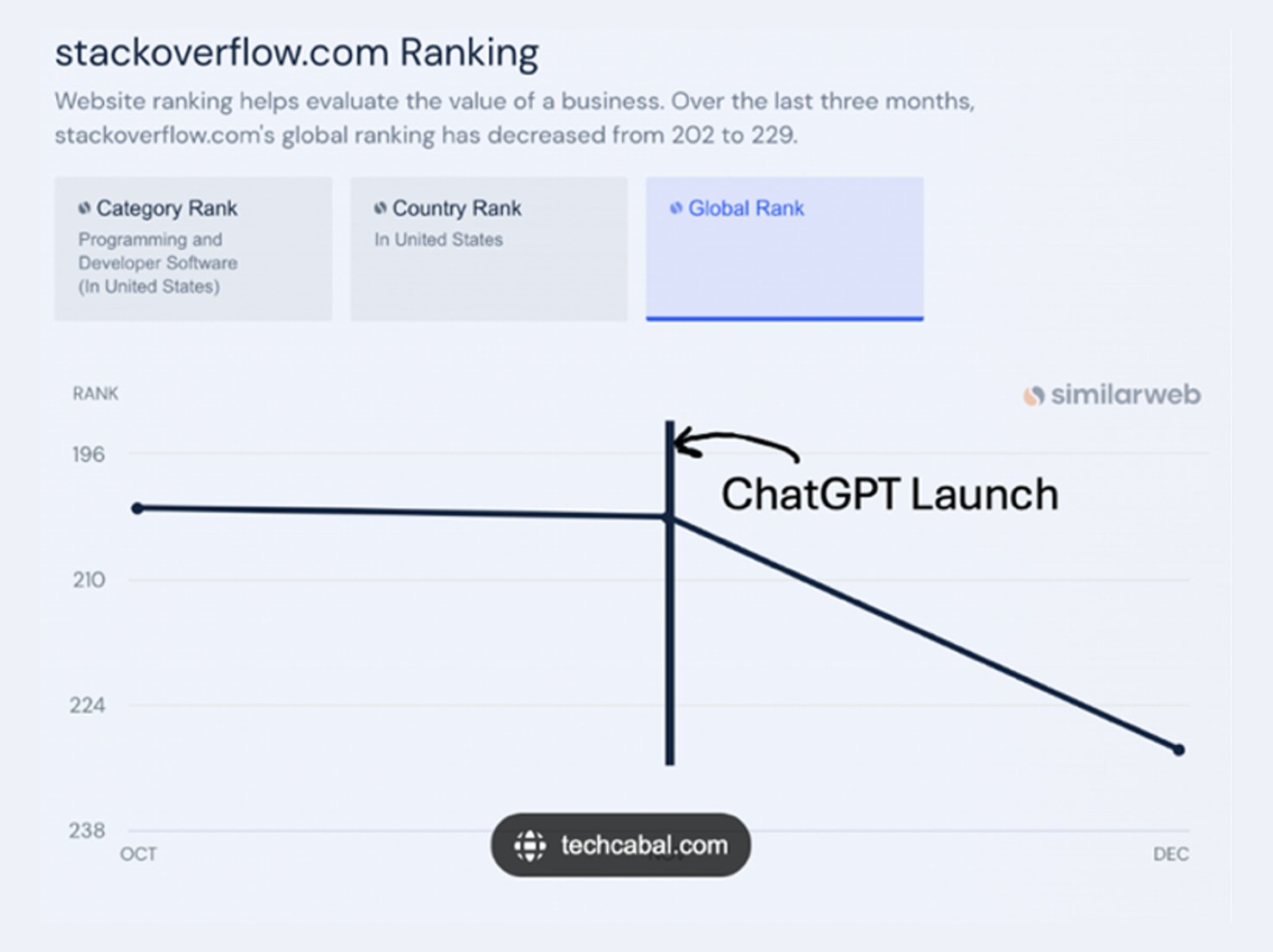
What about a site's KPIs?
As AI interaction increases, our reliance on traditional KPIs must fall.
Every website today uses analytics to drive statistics, such as:
- The number of total visits.
- The number of unique visitors.
- The number of new vs returning visitors.
- Geographical location of visitors.
- Net promoter score.
- Pages viewed per session.
- Dwell time.
- Bounce rate.
- Conversions, including A/B testing.
- Organic search visitors.
- The number of social share impressions.
- Feedback and reviews.
- Cart abandonment.
Design by engineers: a trap
The conference also highlighted a common pitfall: websites designed by engineers focus on looks over function, which does not work well for AI. We need a more structured approach to content modeling for better clarity and organization.
Today’s HTML markup makes sense to the browser:
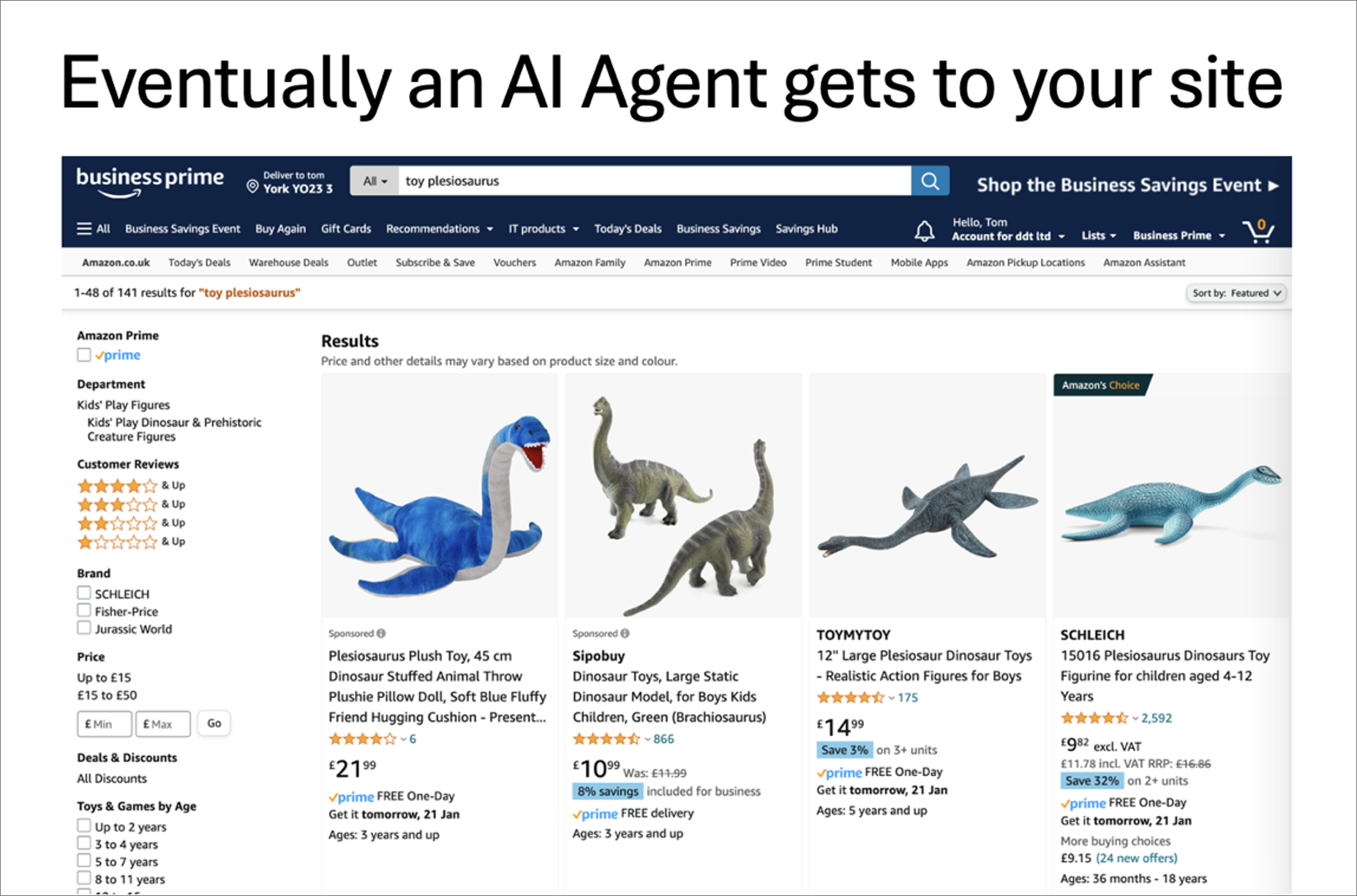
However, opening the “View Page Source” shows a different take:
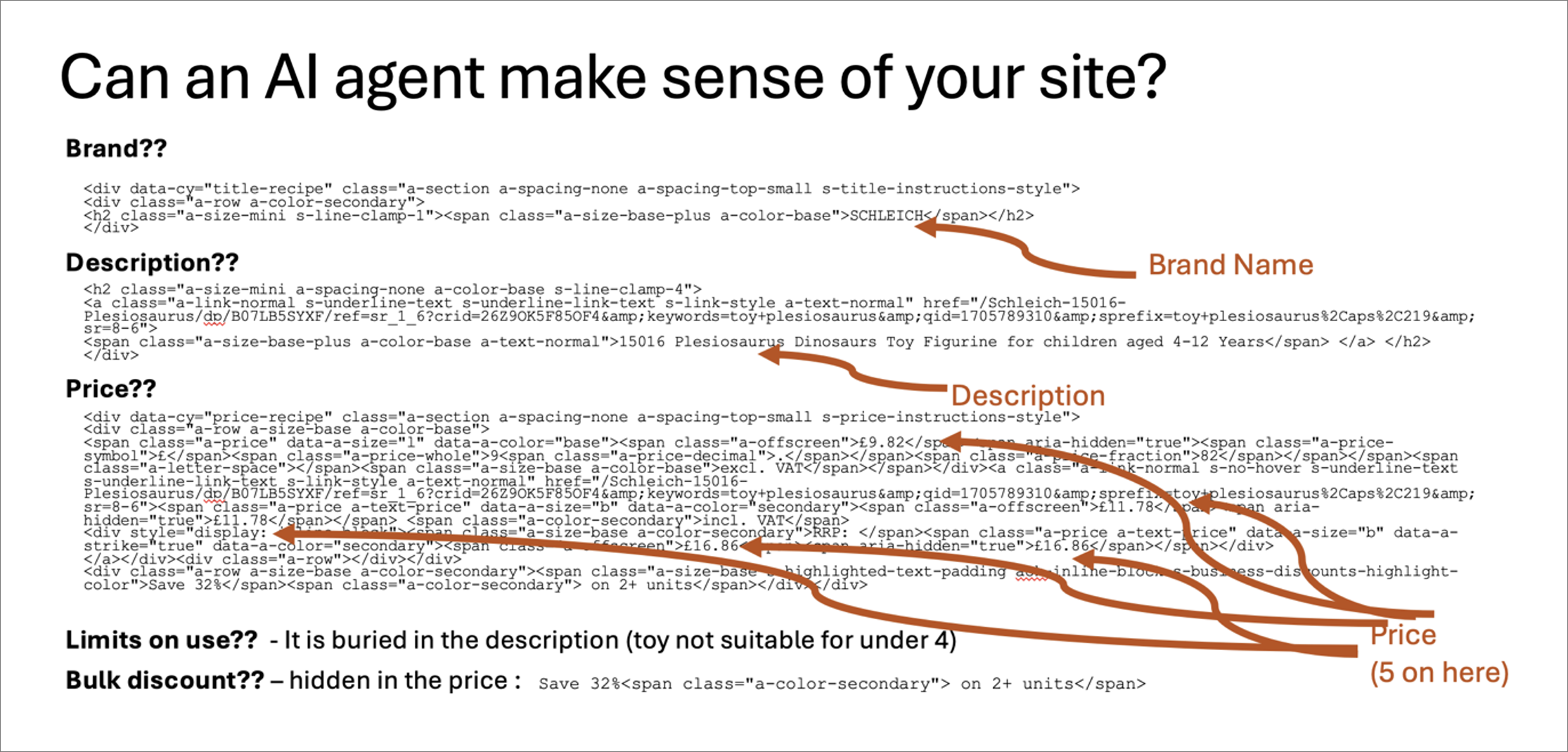
Buried in the HTML are the brand name, the price (more than one is shown in the HTML), and the description. Note that discounts and age suitability are placed in the text. A human reading this would have difficulty, never mind an AI.
Engineers create text and image boxes in your CMS; they let you fill and serve them.
They might call them hero’s carousels, cards, etc. They are dressed up text and image boxes with interactions.
This is the Design by Engineer Trap.
What needs to be added to our sites?
Content Modeling and schema presentation!
A lot has gone wrong. The IT people who made this website are very clever engineers; I could not do this.
The engineers took the site owners' desires and made pretty pictures with text and prices, highlighting discounts. They made it reasonably fast and effective and made the site owner one of the world's wealthiest men.
Look at other sites’ HTML. How do they handle pricing? Awful!
Each site dresses up text in presentations. No semantic meaning is given to the objects described. There is no content modeling. It looks like Al will need an LLM for each brand!! This is not going to work in the Al world.
Something major must happen…
Content modeling the traditional CMS way
You probably already know it: the model gets built into the CMS.
This is a trap.
Designers fixate on the presentation when envisioning a website – and build a style guide with fonts, colors, components, and interactions. They create heroes, cards, lists, articles, carousels, accordions, tabs, text, and much, much, more.
What next?
The content team is asked to create:
- Testimonials. Someone decides that testimonials should be in the cards component.
- Special offers. Someone decides that testimonials should be in the lists component.
- A “coming soon” message. Someone decides that testimonials should be in the image with a link component.
- Bulk discount messages. Someone decides that Bulk Discount should be in the text component.
Content modeling by developers!
So, what do we need to do about this?
We need technical improvements, enthusiastic use of content models, and application of schema without putting cognizant overload on the content team – which is a big ask.
I assure you it will be worth it.
Let’s look at the HTML example we showed earlier, this time with schema applied:
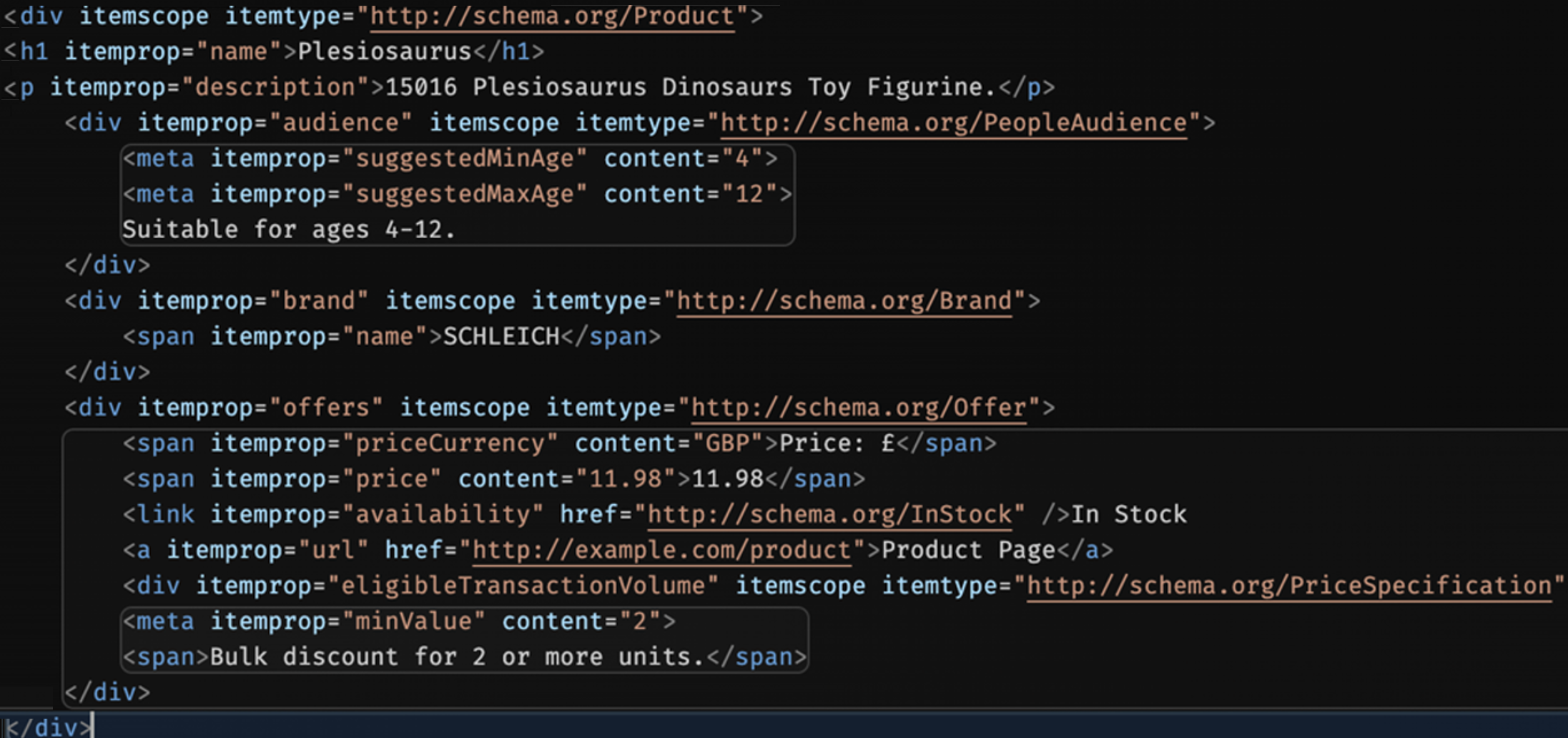
Now a machine can see the price, the description, the brand, the discount, and the age applicability. It knows it is for a product, not an ad on the site.
Call to action
We are in marketing, so we must end with a call to action. So here it is:
Our websites need to target 4 device types: Mobile, Tablet, Desktop, and Machine in the future. Our CMS strategy needs a solid content model that applies consistently across all platforms. This is key for targeted ads, personalized content, and campaign management.
However, the current developer-driven content modeling approach must be revised and rethought. We must wrap our content semantically and stick to structured data schemas. Schema.org is the place to start; that is the technical part. We as an industry need to evangelize and build a joint effort from designers, developers, and content creators to ensure content is built within the model and aligns with the established schema.
As such, teams need to add an “AI Evangelist” to the roles.
The AI Evangelist will be a pivotal figure in our organizations, driving the transformative adoption and implementation of AI technologies. This role bridges technical prowess, strategic insight, and the ability to vividly communicate AI's benefits to diverse audiences. The AI Evangelist will forge partnerships across design, development, content, and testing teams to craft a unified AI vision.
Key Responsibilities of an AI Evangelist:
- Champion AI technology adoption, showcasing tangible enhancements to digital strategies and user experiences.
- Spearhead AI-centric models and strategies, focusing on predictive analytics, personalized content, and AI-powered search optimization.
- Facilitate AI integration into workflows with cross-functional teams, ensuring smooth transitions and peak efficiency.
- Lead educational initiatives like workshops and training to build an AI-savvy culture.
- Monitor and assess cutting-edge AI trends for strategic adoption.
- Cultivate a network with AI vendors and thought leaders to bolster expertise.
- Advise leadership on AI integration, securing necessary resources and investments.
- Examine new opportunities to decrease time-to-market and increase engagement.
Qualifications:
- Proficient in digital marketing, SEO, development, and UX design.
- Exceptional communicator, adept at demystifying complex tech for varied audiences.
- Proven leader and collaborator in team-driven environments.
- A zeal for learning and staying at the forefront of AI advancements.
Desired Skills:
- Background in digital analytics and personalized content strategies.
- Knowledge of CMS and digital content creation.
- Experience with app-based content platforms and audience engagement tactics.
- Strategic thinker, ready to foster innovation and change.
Closing
CMS Kickoff 2024 was pivotal to me.
As an industry, we must reconsider our content strategies in the face of AI's evolution. As we gear up for AI's continued integration into our digital spaces, adopting a structured, semantic approach to content management is more crucial than ever in building cross-team strategies.
These reflections aren't set in stone but are a “call to arms” for the industry. Together, we must prepare for a significant shift in how we design, manage, and deliver content in an AI-first world.
Upcoming conferences

CMS Connect 24
August 6-7, 2024 – Montreal, Canada
We are delighted to present our first annual summer edition of our prestigious international conference dedicated to the global content management community. Join us this August in Montreal, Canada, for a vendor-neutral conference focused on CMS. Tired of impersonal and overwhelming gatherings? Picture this event as a unique blend of masterclasses, insightful talks, interactive discussions, impactful learning sessions, and authentic networking opportunities.

CMS Kickoff 25
January 14-15, 2025 – Tampa Bay Area, Florida
Join us next January in the Tampa Bay area of Florida for the third annual CMS Kickoff – the industry's premier global event. Similar to a traditional kickoff, we reflect on recent trends and share stories from the frontlines. Additionally, we will delve into the current happenings and shed light on the future. Prepare for an unparalleled in-person CMS conference experience that will equip you to move things forward. This is an exclusive event – space is limited, so secure your tickets today.